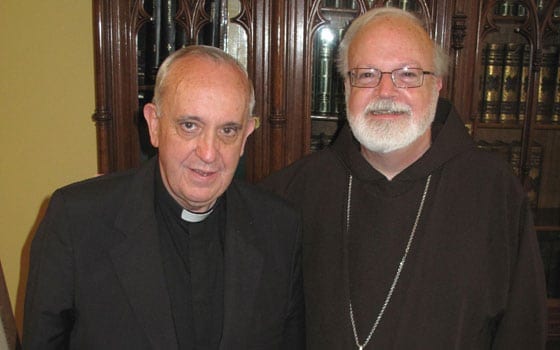

Author: Patrick O’ConnorCardinal Sean P. O’Malley meets with Cardinal Jorge Bergoglio at his residence in Buenos Aires, Argentina in December 2010 as part of a visit to South America. Cardinal Bergoglio was elected Pope Francis I on March 13, 2013.
Donna Gittens can trace her Catholic roots back to when she was a little girl at St. Katharine Drexel Parish in Grove Hall. Since then she has received Baptism there, married her husband there and gave her parents their burial services there.
“My family goes back at least 60 years at the church,” she said.
It’s no surprise then, that Gittens, head of the Newton-based More Advertising Company, was delighted to see the installation of Cardinal Jorge Bergoglio of Argentina as pope.
“This was good news,” Gittens said, “and a hopeful sign that, not unlike the Republican Party, the Catholic Church is recognizing the need to work with people of color.”
At St. Katharine’s alone, Gittens says about 500 African American families worship there, as well more than 1,000 other families from the Caribbean and the continent of Africa.
“You name it, they are here,” Gittens boasted. “Cape Verdeans, Jamaicans, Haitians, Ethiopians and Nigerians.”
Indeed, Latin America represents 40 percent of the world’s 1.2 billion Catholics.
“For me it’s a sign from God, who is inviting us to commit ourselves to a continental mission,” Bishop Eugenio Lira, secretary general of the Mexican conference of Bishops, told the Associated Press. “He will imprint his Latin American personality … He knows the joys, pains, the problems, and the opportunities of the people of Latin America and the Caribbean, and that will create a very close relationship.”
In his first Mass as pope, Francis reinforced his pastoral priorities and service during a brief homily in the Sistine chapel last Thursday.
Francis, who chose the name of a medieval patron saint of Italy who came from wealth and took a vow of poverty, is the first pope to come from the Jesuit order.
The Jesuits take a vow of poverty and have traditionally focused on service, education and engaging with the world.
Simplicity, poverty, rigor,” Rev. Antonio Spadero, the editor of the La Civilta Cattolica, a Jesuit journal close to the Vatican Secretariat of State, told reporters.
The Jesuit ethos is built strongly around academic rigor and missionary service — and since the 1960s has been associated with so-called liberation theology, the view that Jesus’ teachings require fighting for social and economic justice. Francis has called liberation theology a misguided view, but he accepts its goals, according to published reports, such as closing the gap between the comfortable and needy and easing the pressures of western style capitalism.
Two main themes are expected to frame the beginning of the papacy of Pope Francis — the need to reinforce the Vatican’s views on issues such as birth control and women’s ordination and a willingness to do more social outreach and take a more activist role on problems such as poverty and social justice.
Based on his previous writings and statement, Pope Francis appears ready for the challenge. At a meeting of bishops in 2007, the future pope called on the church to purge the “social sin” of chronic poverty and economic inequality.
The Jesuit teachings are particularly important to Meyer Chambers, the Boston College Minister for Liturgical Arts and former director of the Archdiocese of Boston’s Office of Black Catholics.
Like Gittens, he is a member of St. Katharine Drexel Parish, and he traces his interest in Catholicism to St. Peter Claver, the Jesuit priest who ministered to Africans enslaved in Colombia in the 17th Century.
“Because of his humility, because of his willingness to serve the people, St. Claver was known as the slave of the slaves,” Chambers said.“It is the Jesuit philosophy of Pope Francis that makes this such an exciting time for the Catholic Church. He wants to be a man of the people.”
Chambers said the installation of a Jesuit was a radical departure from previous Popes, and their action suggests that the Catholic Church was quite willing to look at itself and its diversity and make an appointment that symbolizes the universality of Catholics.
“This doesn’t mean,” Chambers was quick to add, “that Pope Francis will stray from the teachings of Jesus Christ or promote views that are antithetical to those teachings.”
What it means, at least to Chambers, is that Pope Francis is a “humble person” and willing to work “as a servant of the people.”






